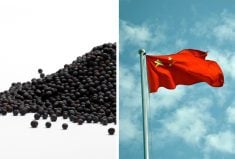ZURICH (Reuters) — Swiss firm Syngenta, the world’s largest maker of crop chemicals, suffered a bigger than expected fall in first-quarter sales having been hit by low commodity prices, the strong dollar and a prolonged winter in the United States.
The price of corn fell about 15 percent in 2014, on top of a decline of nearly 40 percent in 2013. After years of cashing in on soaring crop prices farmers are now scrutinizing spending.
This has put firms like Syngenta under pressure and made raising prices more difficult.
“In the end, the problem that the entire industry has had is that commodity prices are at comparably low levels,” Vontobel analyst Patrick Rafaisz said. Rafaisz has a ‘hold’ rating on the stock.
Read Also

Canada and China discuss disputes over canola and EVs, says Ottawa
Senior Canadian and Chinese officials discussed bilateral trade disputes involving canola and electric vehicles on Friday, Ottawa said, but gave no indication of any immediate breakthrough.
Basel-based Syngenta reported sales of US$4 billion for the first three months of the year, a 14 percent fall compared with last year and below the average forecast of $4.3 billion in a Reuters poll. Sales were unchanged at constant exchange rates.
Excluding the herbicide glyphosate and the countries of the former Soviet Union, where Syngenta has raised prices in response to the situation in Ukraine, prices rose only one percent in the first quarter while volumes were seven percent lower.
A shift by farmers in the Americas to soybean from corn is also an issue for firms like Syngenta as soybean requires less crop protection.
The recent strength of the dollar, the firm’s reporting currency, was also a strain while harsh weather in the United States added to the pressure on North American sales, its third biggest market last year.
Syngenta’s finance chief told Reuters the company expects the North America business to recover in the second quarter.
Syngenta is also facing legal issues in the United States, where last year global grain handlers Cargill and Archer Daniels Midland, along with hundreds of farmers, sued it for damages stemming from China’s rejections of shipments of genetically modified U.S. corn.
Syngenta chief executive Mike Mack told Reuters this case would last a number of years and that the company feels its defence is very strong.
Despite these hurdles, Syngenta maintained its full-year targets and its longer-term target for 2018.














